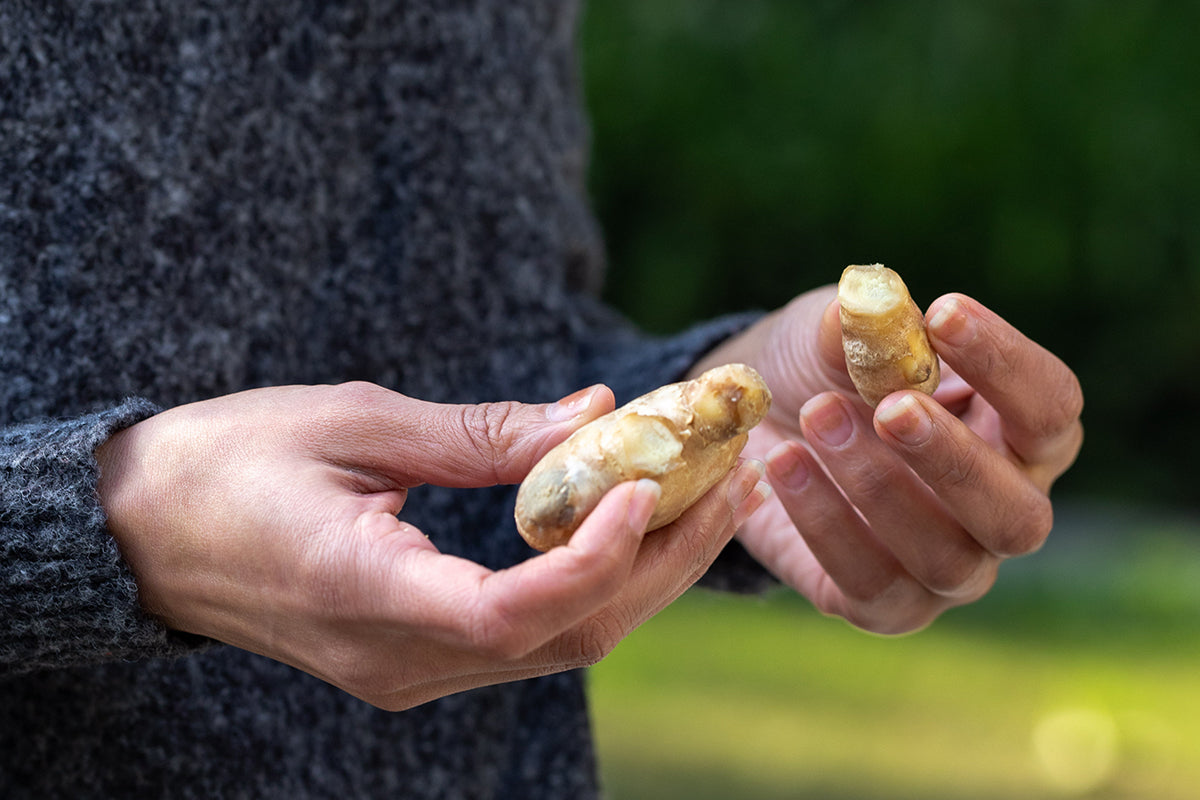
Vata dosha, composed of Air and Space elements, governs movement, creativity, and vitality in the body.
Vata is associated with the principle of kinetic energy in the body, is mainly concerned with the nervous system, and controls all body movement. Vata's dynamic and mobile nature makes it the primary force behind nerve impulses, communication between cells, and the transmission of information throughout the body. Vata governs the movement of thoughts, sensations, and signals within the nervous system, playing a vital role in cognitive functions, memory, and learning.
Vata dosha is characterised by dryness, cold and lightness. Its innate effects take precedence over the conditional qualities it picks up from its environment.
People with dominant Vata ‘prakriti’ are creative, free spirited, and enthusiastic.
Why and how to balance Vata Dosha?
Balancing Vata is crucial for overall well-being. When Vata is in harmony, it promotes stability, optimal digestion, and a healthy nervous system, leading to mental clarity and emotional balance. Additionally, balanced Vata supports sound sleep, flexibility, and adaptability, enabling individuals to cope with life's changes effectively. It also ensures healthy circulation, healthy joints and enhanced creativity.
On the other hand an imbalanced Vata can lead to nervous system disturbances, causing symptoms like anxiety, restlessness, insomnia, and nervousness. Migraine, toothache, flatulence, pain in the calf muscles, stiffness and crackling sounds from the joints, irregular periods and bowel movements are also attributed to an out of balance Vata.
Being the most delicate of the doshas, Vata can be easily aggravated if not paid attention to. Like going hungry for long periods, overexerting physically and mentally, consumption of cold, light and easily digestible foods can cause an imbalanced Vata. Packaged foods should also be avoided as they tend to trigger all doshas.
To pacify the dosha, include spices and herbs like hing, jeera, ajwain, elaichi, adrak, haldi, ashwagandha, and brahmi. Taken in moderation and as per requirement, these can work wonders and bring the grounding effect in Vata bodies. Adding ghee and other natural healthy fats along with regular intake of water to your daily diet help combat dryness and aids in balancing Vata.
Ginger, a versatile spice highly valued in Ayurveda, holds remarkable properties that help in managing Vata dosha. Its inherent warmth and pungent taste make it a much sought after Vata-pacifying herb. Ginger aids in kindling the digestive fire, is anti-inflammatory in nature and promotes healthy circulation throughout the body.
In Indian kitchens, ginger is an indispensable ingredient used in many ways and forms, such as an infusion in teas, added to tempering (tadkas) for curries, or incorporated in daily preparations as a masala (dry ginger powder). This daily use of ginger in culinary delights helps naturally maintain Vata balance, making it an essential ally for overall well-being.
Ginger Benefits in Ayurveda For Vata Balancing
While balancing Vata dosha, ginger helps manage many health conditions and has multiple health benefits:
1. Stimulates Nervous System:
Ginger's stimulating effects extend to the nervous system as well. The herb is known to have a warming and invigorating impact on the body, which helps increase alertness, focus, and overall mental clarity.
In Ayurveda, ginger is often used to address symptoms of fatigue and lethargy. Its ability to activate the nervous system specially benefits during periods of low energy or when feeling mentally foggy.
2. Improves and Promotes Digestion:
Ginger is renowned for its ability to stimulate digestion and alleviate various digestive issues. It has been shown to promote the secretion of digestive enzymes and bile, aiding in the breakdown of food and absorption of nutrients. This helps to prevent common problems like bloating, gas, and indigestion.
Additionally, ginger's carminative properties help relax the gastrointestinal muscles, reducing spasms and easing discomfort. It also accelerates the movement of food through the digestive tract, which can be beneficial for individuals experiencing constipation. Regular consumption of ginger can contribute to a healthier digestive system.
3. Anti-Inflammatory Properties:
Another remarkable benefit of ginger lies in its potent anti-inflammatory and antimicrobial properties. The bioactive compounds in ginger, especially gingerol, exhibit strong anti-inflammatory effects, helping to reduce inflammation and swelling in various parts of the body.
Studies have also suggested that ginger may be beneficial for individuals suffering from inflammatory conditions such as osteoarthritis and rheumatoid arthritis, as it helps to alleviate pain and improve joint function.
4. Antimicrobial and Immunity Booster:
Ginger contains natural antimicrobial compounds that can combat harmful bacteria and viruses. This property makes ginger a valuable ally in enhancing the body's immune system and defending against infections.
Uses of Ginger in Ayurveda For Vata Balancing
It is imperial to keep Vata in balance and with the help of ginger, it can be achieved in many ways:
1. Ginger Herbal Tea for Vata Balancing
Ginger herbal tea is a popular Ayurvedic remedy for balancing Vata dosha. The warm and soothing nature of ginger helps pacify Vata's cold and dry qualities. To prepare the tea, simmer sliced or grated fresh ginger in water for about 10 minutes.
This tea can ease digestive issues, reduce bloating, and promote relaxation. (Try Butterfly Ayurveda’s Ginger Black Tea, specially formulated to balance Vata Dosha)
2. Ginger in Cooking
Incorporating ginger in cooking is another way to balance Vata. Adding ginger to everyday food preparations of tea, vegetables, dals and curries enhances the taste and aids digestion. It also provides a grounding effect, helping to counterbalance Vata's light and erratic qualities.
3. Ginger in Oil Massage
Ginger-infused oil massage, is a rejuvenating practice that helps nourish the body and calm Vata. Warm ginger oil massages enhance circulation, reduce muscle tension, and alleviate joint stiffness, promoting overall well-being.
4. Ginger Supplements
For those who find it challenging to include ginger in their daily diet, ginger supplements in the form of capsules, powders or liquid extracts containing bioactives such as Gingerol, Shogaol etc., can provide a convenient alternative.
These supplements offer the goodness of ginger's therapeutic properties in a concentrated and easily consumable form. However, it is essential to exercise caution and seek guidance from an Ayurvedic practitioner before incorporating these supplements into your regimen.
Takeaway
The Airy Dosha- Vata, controls all the movement in the body; physically, mentally and psychologically. Ginger's natural ability to stimulate digestion, eases discomfort and promotes a healthier gut, while its potent anti-inflammatory and antimicrobial properties help fight off infections and reduce inflammation in the body. Additionally, ginger's stimulating effects on the nervous system enhance mental clarity, alertness, and vitality, making it a natural energy booster.
Incorporating ginger into your lifestyle offers a holistic way to balance Vata dosha and enhance overall well-being. This potent herb holds numerous benefits for addressing Vata-related imbalances, whether through indulging in herbal tea, culinary delights, soothing oil massages, or the convenience of supplements.
Embracing ginger as a regular part of your diet and wellness routine allows you to harness its therapeutic properties for a life of balance, serenity, and optimal health with harmony.
Remember, with the right guidance, you can fully maximise the potential of ginger's therapeutic benefits.
Frequently Asked Questions (FAQs)
Q1. What are the side effects of ginger in Ayurveda?
While ginger is generally safe, excessive consumption may lead to certain side effects. In Ayurveda, ginger's heating nature can aggravate Pitta dosha, leading to symptoms like heartburn, acidity, or skin rashes.
Moderation is key; avoid consuming large quantities of ginger if you have a Pitta constitution or are experiencing Pitta imbalances.
Q2. Does ginger cause Pitta?
Yes, excessive ginger intake can cause an increase in Pitta dosha due to its heating and sharp qualities. However, when used in moderate amounts, ginger can still benefit those with a Pitta constitution, as it aids digestion and reduces inflammation. For Pitta individuals, it's best to use ginger in a balanced manner, combining it with cooling herbs or spices to prevent Pitta aggravation.
P.S.- Please note that Ayurveda emphasises individuality, so it's always wise to consult an Ayurvedic practitioner to determine the best approach for your unique constitution and health conditions. With mindful usage, ginger can be a valuable ally in maintaining Vata balance and promoting overall well-being.

Comments (0)
Back to Ayurveda & Wellness Wisdom